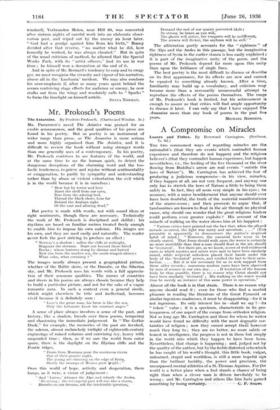Mr. Prokosch's Poems
The Assassins. By Frederic Prokosch. (Chatto and Windus. 5s.) Ma. PROKOSCH'S novel The Asiatics was praised for an exotic sensuousness, and the good qualities of his prose are found in his poetry. But as poetry is an instrument of
wider range than prose, so The Assassins is more serious and more highly organised than The Asiatics, and it is difficult to review the book without using stronger words than one generally uses of a contemporary. In his poetry, Mr. Prokosch contrives to see features of the world, and at the same time to see the human spirit, to detect the dangerous deceptions of the charming word and the too- facile tenderness, to grieve and rejoice without sentimentality or exaggeration, to purify by sympathy and understanding rather than by abuse or violent exhortation the evil which is in the world because it is in ourselves :
" How but by terror and love Burst the shell from our eyes, Rise from the adoring bed, Thread the black shore, hear far Behind the Arabian sighs
Of the vast and alluring dead."
But poetry is made with words, not with sound ideas or right sentiments, though these are necessary. Technically the work of Mr. Prokosch is disciplined and skilful : his rhythms are based on familiar metres treated freely enough to enable him to impose his own cadence. His images are his own, and they are used easily and naturally. The reader never feels the poet striving to produce an effect :
" Norway's a shadow : sullen the cliffs at midnight, Stagnant the streams. Stare out beyond those fisted Rocks ; whose features stung by disease and hatred Now rise from the mother sea, the moth-winged silence s What calm, what certainty ? "
The images nearly always present a geographical picture, whether of the Baltic shore, or the Danube, or the Siberian sky, and Mr. Prokosch uses his words with a full apprecia- tion of their sensuous qualities. The names of countries and rivers in his poems are always chosen because they help to build a particular picture, and not for the sake of a vague romantic aura. In such a context even a general simile, which might elsewhere be trite and ineffectual, becomes vivid because it is definitely seen :
" Love's the great man, his brow is like the sea, Only the fortunate know his constant anger."
A sense of place always involves a sense of the past, and history, like a shadow, broods over these poems, tempering and chastening the immediate judgement. In " The Gothic Dusk," for example, the memories of the past are invoked,
the solemn, almost melancholy twilight of eighteenth-century engravings of ruined columns and entwining ivy, heavy with suspended time ; then, as if we saw the world from outer space, there is the daylight on the Illyrian cliffs and the Pontic ridges,
" Down from Montana pour the enormous rivers Out of their granite night, The young are chanting on the edge of Syria, Slowly the swamps of Mexico grow bright "
Over this world of hope, activity and desperation, there hangs, as it were, a vision of judgement :
" And Listen,' whisper the Alps and whistle the Andes, Be strong ; the revengeful past will rise like a storm, Breathe on our dreams, ask tho intolerable question;
Demand the end of our quaint perverted idols Be strong, be brave as you will, The ghosts will arrive, the tempests will be indifferent, The streets will flicker," the asylums will be still:' " •
The alliteration partly accounts for the " rightness " of the Alps and the Andes in this passage, but the imaginative rightness of Syria in the earlier stanza is less easily explained : it is part of the imaginative unity of the poem, and the poems of Mr. Prokosch depend far more upon this unity than upon the brilliance of single lines.
The best poetry is the most difficult to discuss or describe on its first appearance, for its effects are new and cannot be equated to something already known. After a time, familiarity may build up a vocabulary, and criticism may become more than a necessarily unsuccessful attempt to reproduce the effects of the poems themselves. The range of Mr. Prokosch's book is limited, but his achievement is enough to assure us that critics will find ample opportunity to discuss it later. I can only say that I have enjoyed The Assassins more than any book of poems in the past five










































 Previous page
Previous page